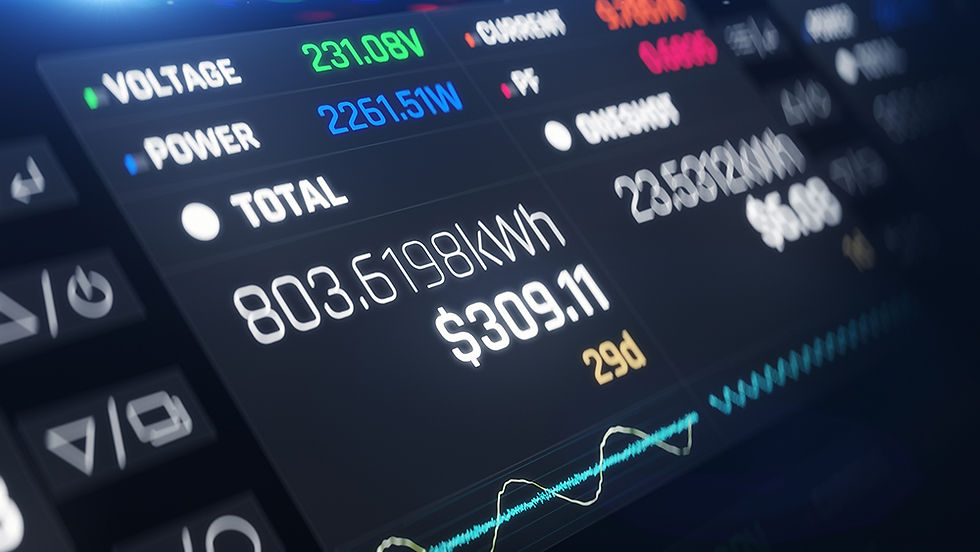The Power of Energy Intelligence: Transforming Homes and Businesses
- Jonny Appleton
.png/v1/fill/w_320,h_320/file.jpg)
- Nov 16, 2023
- 4 min read
Sustainability and environmental innovation are at the core of a lot of national policies around the world and have given space for the concept of energy intelligence to emerge as a way to best manage and streamline energy costs and forecasting.
However, it's a game-changer further down the chain for both homeowners and commercial users.
Energy intelligence represents the synergy of cutting-edge technology and smart decision-making, aimed at optimizing energy consumption while minimizing costs and environmental impact. In this article, we will delve into the manifold benefits of energy intelligence, exploring how it empowers individuals and organizations to make informed, eco-friendly, and economically sound choices.

Understanding Energy Intelligence
Before we delve into the advantages of energy intelligence, it's essential to comprehend what this term encompasses. Energy intelligence refers to the ability to collect, analyze, and interpret data related to energy usage, with the primary goal of optimizing energy consumption. It relies on various tools and technologies, such as smart meters, IoT (Internet of Things) devices, and sophisticated software that provide real-time data, insights, and predictive analytics to make informed decisions about energy usage.
Find out more how enee.io harnesses energy intelligence here.
Benefits for Homeowners
Reduced Energy Costs: For homeowners, one of the most immediate and tangible benefits of energy intelligence is the potential for significant cost savings. By closely monitoring energy consumption patterns and making informed adjustments, homeowners can cut down on their utility bills.
Environmental Impact: Energy intelligence empowers homeowners to be more environmentally responsible. By reducing energy consumption, carbon footprints can be significantly reduced, contributing to the fight against climate change.
Increased Comfort and Convenience: Smart home technologies that are part of the energy intelligence ecosystem can enhance the overall living experience. Whether it's closely monitoring back up power sources and grid, or utilising technologies like smart thermostats, lighting, and appliances that can be controlled remotely or through voice commands, it's a great way of making everyday life more convenient and comfortable.
Real-time Insights: Homeowners can access real-time insights into their energy usage, helping them understand how specific activities or appliances impact their energy bills. This knowledge allows for more targeted efforts to reduce energy consumption.
Predictive Maintenance: Energy intelligence can also help homeowners predict maintenance needs for their appliances and HVAC systems, preventing costly breakdowns and increasing the lifespan of their equipment.
Incentives and Rebates: Many utility companies and governments offer incentives and rebates to homeowners who adopt energy-efficient technologies and practices. Energy intelligence can help homeowners qualify for these financial benefits.
Benefits for Commercial Users
Cost Savings: Just like homeowners, businesses benefit from significant cost savings through energy intelligence. By optimizing their energy consumption, they can reduce operational costs and improve profitability.
Carbon Footprint Reduction: For environmentally conscious companies, energy intelligence helps in achieving sustainability goals. It allows them to minimize their carbon emissions, which is increasingly important for both reputation and compliance with environmental regulations.
Enhanced Operational Efficiency: Energy intelligence enables businesses to identify inefficiencies in their energy usage. By streamlining operations and making data-driven decisions, they can enhance overall efficiency and productivity. This is particularly useful if there are multiple sites to manage.
Peak Load Management: Many businesses are charged based on peak energy consumption during specific hours. Energy intelligence allows companies to strategically manage and reduce peak loads, thereby avoiding costly demand charges.
Energy Procurement Optimization: Large commercial users often negotiate energy supply contracts. Energy intelligence can help them make more informed choices regarding energy providers, ensuring the best rates and terms.
Energy Performance Benchmarking: Energy intelligence provides businesses with tools to benchmark their energy performance against industry standards and competitors. This valuable insight can drive improvements and competitiveness.
Regulatory Compliance: Many businesses are subject to energy and emissions regulations. Energy intelligence simplifies compliance by monitoring energy usage and automating reporting processes.
Find out how enee.io monitors commercial sites here.
Challenges and Considerations
While the benefits of energy intelligence are evident, it's crucial to acknowledge some of the challenges and considerations associated with its implementation:
Initial Investment: The adoption of energy intelligence technologies often requires an initial investment in hardware, software, and professional installation, which can be a barrier for some homeowners and businesses.
Data Security: Collecting and analyzing sensitive energy usage data can raise concerns about data security and privacy. Robust security measures are essential to protect this information from potential breaches.
Technological Expertise: Effectively using energy intelligence tools may require a certain level of technological expertise. Users may need to invest time and resources in training and education.
Integration Complexity: In some cases, integrating different energy intelligence solutions can be complex. It's important to ensure that all components work seamlessly together.
Regulatory Compliance: For businesses, staying in compliance with energy-related regulations can be a complex and evolving process. This may necessitate legal and regulatory expertise.
enee.io utilising an easy-to-install system where no specialist tools or training is required to setup. Get in touch now.
Conclusion
Energy intelligence is the future of sustainable living and business operations. The benefits it offers, from cost savings to environmental responsibility, make it an essential component of any energy-conscious strategy. Homeowners and commercial users alike can harness the power of data-driven decision-making to optimize energy consumption, reduce costs, and contribute to a greener future.
As technology continues to evolve, energy intelligence will become even more accessible and integrated into our daily lives, further empowering individuals and organizations to make smarter, more sustainable energy choices. The time for embracing energy intelligence is now, and the benefits it brings are boundless for those willing to seize this opportunity.